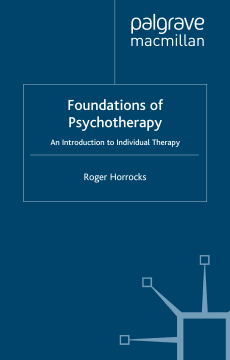
Additional Information
Book Details
Abstract
This book provides a comprehensive and clear survey of the major theoretical schools of psychotherapy - including Freudian, Jungian, humanistic and cognitive. There is also some consideration of the impact of new discoveries in neuroscience upon psychotherapy, and of the status of psychotherapy as a profession.
The book also provides a concrete, detailed and hands-on introduction to working with clients, with many vivid and helpful vignettes from actual sessions. Many practical issues are covered, including:
- how the setting for therapy can become a safe and secure container
- ways in which the therapist/client relationship can be used an invaluable tool in therapy
- how client negativity can be handled
- methods for dealing with the difficult or disturbed client
The book also covers more controversial issues such as the authentic relationship, the role of the body in therapy, and the therapist's own self-disclosure.
This book is an essential introduction to psychotherapy for all trainee psychotherapists.
This book comprehensively and clearly surveys the major theoretical schools of psychotherapy - including Freudian, Jungian, humanistic and cognitive. There is also some consideration of the impact of new discoveries in neuroscience upon psychotherapy. The book also provides a concrete, detailed and hands-on introduction to working with clients, with many vivid and helpful vignettes from actual sessions. Many practical issues are covered, including the setting for therapy; the therapist/client relationship; client negativity; and the difficult or disturbed client.
ROGER HORROCKS was a Senior Lecturer in Linguistics at the University of Hertfordshire and is now a Psychotherapist in private practice and supervisor of therapists and trainees. His publications include Masculinity in Crisis: Myths, Fantasies and Realities (Macmillan: 1994), Male Myths and Icons: Masculinity in Popular Culture (Macmillan: 1995), An Introduction to the Study of Sexuality (Macmillan: 1997), and Freud Revisited: Psychoanalytic Themes in the Postmodern Age (Palgrave: 2001)
Table of Contents
| Section Title | Page | Action | Price |
|---|---|---|---|
| Contents | vii | ||
| Acknowledgements | viii | ||
| 1. Introduction | 1 | ||
| Part I. Theoretical Foundations | 9 | ||
| 2. Freud and Jung | 11 | ||
| 3. Humanistic Psychology | 33 | ||
| 4. Cognitive Therapy | 50 | ||
| 5. Neuroscience and Psychotherapy | 61 | ||
| 6. Psychotherapy as a Profession | 71 | ||
| Part II. Practical Methods | 85 | ||
| 7. The Setting: Time, Space and Money | 87 | ||
| 8. Working with Clients | 104 | ||
| 9. The Relationship between Therapist and Client | 130 | ||
| 10. Thinking, Feeling and the Body | 147 | ||
| 11. Negativity | 157 | ||
| 12. Symbolism: The Dynamics of the Inner World | 172 | ||
| 13. Difficult Clients | 182 | ||
| 14. Conclusions | 194 | ||
| Index | 199 |
